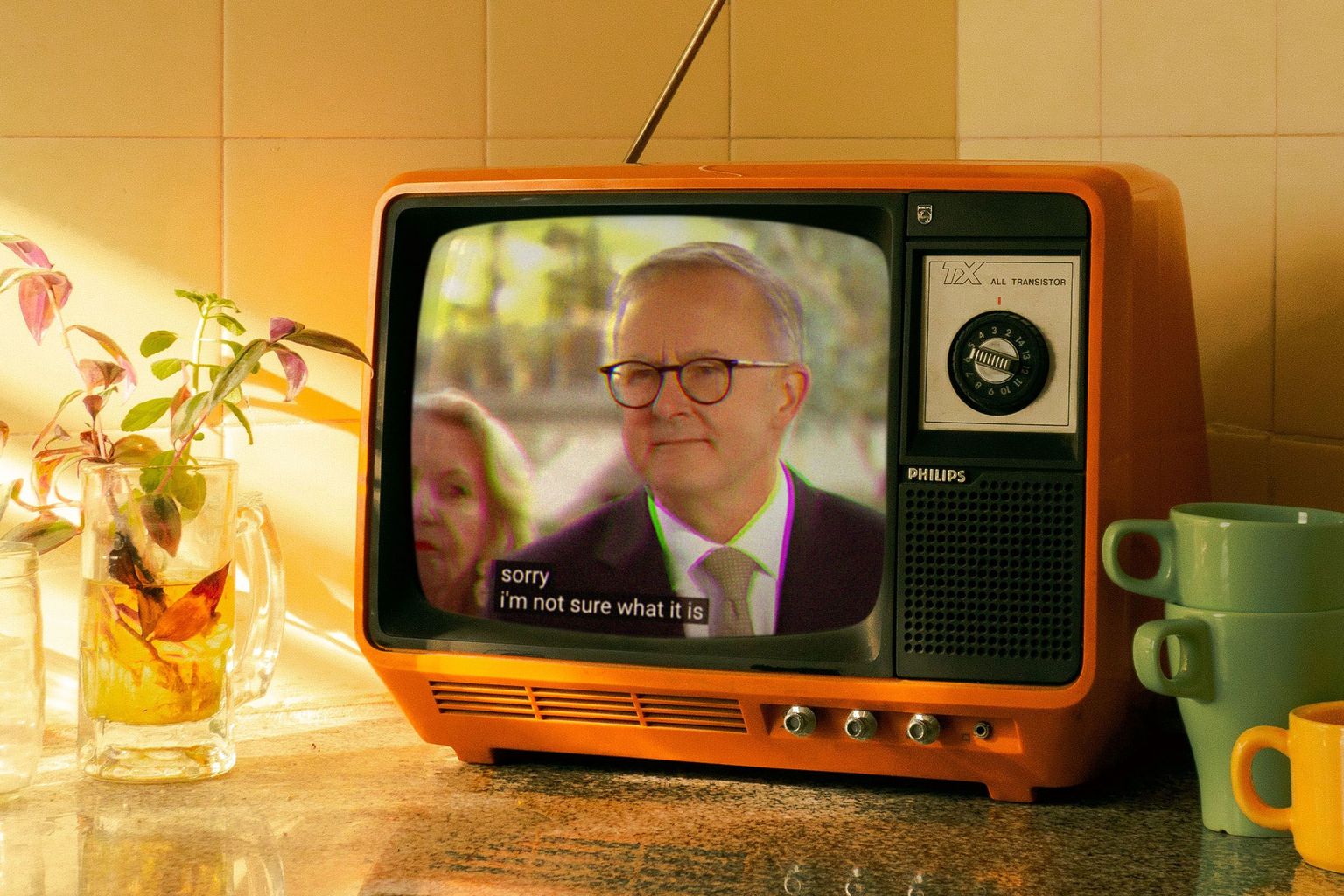Inside out: How the media lost its perspective—and the 2022 federal election
While reporters were busy asking trivia questions, others sat on news that would have sent shock waves through the political system. Will the press learn from its mistakes? Ben Eltham investigates.

Photo illustration: Emily Thiang and Francisco Andreotti
It was the moment that threatened to derail Labor’s election campaign. On the hustings in Tasmania, Anthony Albanese committed… a gaffe.
Asked by a journalist what the unemployment rate was, Albanese flubbed the answer. In front of the cameras! Forgetting the number, his tongue flailed in a moment of glossolalia. Needless to say, it did not go well for him. Headlines screamed, pundits opined, and editors rushed to their booths. Before the end of the day, endless loops of Albanese’s misfortune spooled across the television news.
“Albanese could pay a staggering cost for a stupid mistake”, thundered Nine’s chief political correspondent, David Crowe. “Anthony Albanese has stumbled on the first day of the election campaign, unable to recall key economic figures,” wrote the ABC’s Matthew Doran. It was, many in the media agreed, a possible turning point in the 2022 federal election campaign.
Except it wasn’t. While dominating coverage for at least two crucial weeks of the campaign, the gaffe barely registered with voters, most of whom wouldn't have been able to name the unemployment rate off the top of their heads either. Labor cruised to victory. The Liberal Party crashed to a devastating defeat.
But while voters obviously didn’t care, Albanese’s now-forgotten gaffe had an enduring effect: it encouraged journalists to keep trying to trick Albanese into more embarrassments. And how they tried. Media conferences became more and more combative, as an excited press gallery shouted increasingly incoherent questions at the opposition leader. The commentary cycle moved on to articles and snippets about why Albanese’s gaffe wasn’t registering with voters, and whether that meant they weren’t paying attention to the campaign. An Australian Financial Review journalist then tried the same trick on Greens leader Adam Bandt, who dismissed him with a short “Google it, mate!” By the final week of the campaign, Albanese’s media conferences were almost unwatchable, with the future prime minister shouted down by a media pack that resembled a baying mob.
An obsession with gaffes wasn’t the only disappointing aspect of the media’s efforts to cover the 2022 campaign. Many other aspects of campaign coverage seemed superficial, insubstantial or simply out of touch. As The Guardian pointed out in May, the issues that mattered to voters were precisely not those given coverage by much of the media. According to the content crunch by Josh Nicholas, Nick Evershed and Khaled Al Khawaldeh, while the media correctly paid attention to rising prices and cost of living pressures, other aspects of media coverage strayed far from the issues at the top of voters' minds. Aged care and health ranked second and third most important for voters, according to an ANU survey, but numbered only fourteenth and ninth in media coverage. Climate change, an issue that victorious Green and Teal candidates used to win multiple seats off the government, ranked only seventh on the list for the media.
By mid-campaign, much of the News Corp empire had dispensed with covering issues altogether, preferring manufactured hit pieces criticising the Teals and Greens, or unhinged rants on the late-night segments of Sky News. In contrast, Morrison was given curiously positive coverage throughout, perhaps because many in the gallery remained embarrassed by his unexpected victory in 2019. The nadir was a wretched piece of ‘colour’ reporting from Nine’s James Massola, who fell hard for the campaign charms of Morrison’s wife Jenny. “If Jenny Morrison could meet 50.1 per cent of voters, Scott Morrison would be prime minister for life,” Massola argued. Unhappily for the Morrisons, Jenny fell around 7 million voters short of this target.
An electoral realignment of this magnitude should have been observable—if journalists were looking, there were plenty of harbingers of the landslide.
By the week of the election, many media observers had begun to despair. The Monthly’s Rachel Withers, whose daily coverage stood out for its perceptive engagement with policy substance, found the spectacle of the media’s self-abasement depressing:
It’s quite sad, frankly, to again be covering the conduct of the media, which time and again has decided to make itself the story during this election campaign… today’s display, in which journalists refused to go to the announcement of the very thing they had been asking about, opting instead to lecture, test, and “gotcha” Albanese some more (with a few notable exceptions), only proved what a twisted conception some in the media have of their role in this campaign.
Ironically, for all the meaningless campaign frippery, two senior members of the Canberra press gallery were sitting on a truly explosive story: that Morrison had given himself secret ministries without telling his cabinet.
The scoop belonged to News Corp journalists Simon Benson and Geoff Chambers. A long-term Coalition fellow traveller, Benson had risen through the ranks at News Corp to become The Australian’s political editor. It was from this lofty position that he was able to secure the classic prize of what is sometimes called ‘access journalism’: a fly-on-the-wall account of Morrison’s leadership during the depths of the pandemic. As Benson and his co-author Chambers revealed in their book Plagued, Morrison had used the pretext of the pandemic to bend Westminster governance conventions almost to breaking point. Using the apparatus of the executive council, Morrison secretly appointed himself to no fewer than five dual ministries, including Treasury and Home Affairs, in most cases without telling the other ministers involved, and with the apparent connivance of the Governor-General.
If the scoop had been published before the election, it would have had incalculable impacts on the political scene, possibly even leading to Morrison’s replacement by his duped colleagues. The revelations have since led to an official inquiry, scrutiny of the Governor-General who greenlit the secret dual appointments, and calls for Morrison to resign from Parliament. As journalism professor Matthew Ricketson wrote recently, “what began as two News Corp Australia journalists’ attempt to secure Scott Morrison’s reputation as the leader who steered Australia through the global pandemic looks most likely to have tarnished his legacy forever”. But we could perhaps forgive Benson for not breaking the story during the election. After all, he was dating a Coalition cabinet minister, Bridget McKenzie.
As important as the story of Morrison’s secret ministries was, the media missed a much bigger and more obvious story, even as it unfolded in front of their eyes. 2022 saw the electoral destruction of the contemporary Liberal Party, the most successful political force in modern Australian history. The Liberal Party that Scott Morrison led to defeat had governed Australia for 20 out of the past 26 years. And that Liberal Party didn’t just lose government. It lost its electoral base. It lost its future leader, Josh Frydenberg, and rising stars like Katie Allen and Tim Wilson. It lost seats it had held since the formation of the party, like Kooyong and Higgins in inner Melbourne and Curtin on the beaches of Perth. As George Megalogenis pointed out in June, the Coalition now holds just 17 of 84 seats in Australian cities.
Predictably, there hasn’t been a lot of self-reflection from journalists and editors about their performance in 2022.
An electoral realignment of this magnitude should have been observable—if journalists were looking, there were plenty of harbingers of the landslide. Polling clearly showed Labor ahead and the Coalition struggling amongst women and renters, especially on issues like health and climate change. Media outlets that dispatched journalists to the hustings with the time and resources to actually report were rewarded with journalism that discerned a major shift in voter sentiment—for instance, Guy Rundle in Crikey and Lech Blaine for The Monthly. But not many media outlets did this. Bigger media organisations, including the ABC, remained focused on the bells and whistles of the leadership debates, and the daily drip-feed of election announcements.
Predictably, there hasn’t been a lot of self-reflection from journalists and editors about their performance in 2022. We have yet to see any apologies from those predicting Albanese’s electoral doom after the gaffe about unemployment figures. Even if veterans such as Laura Tingle and Nick Bryant were clearly uncomfortable with the ‘gotcha’ shenanigans of the final week, many journalists clearly prefer to criticise what they see as an uninformed audience; editors at Nine even spiked a negative review of its own election debate.
The flaws in the way the media covers elections have been noted by perceptive observers for a long time. On a visit to Australia back in 2010, American media commentator Jay Rosen did an interview with the ABC’s Leigh Sales. Rosen decried “horse-race journalism” as an easy but ultimately empty trope for political coverage, and pointed out it was dangerous for journalists to portray themselves as “insiders”:
“It kind of imagines the campaign as a sporting event, right, and everything that happens in the campaign can potentially affect the outcome, so you can look at it as, 'how is it going to affect the horse race?', and every day you can ask, 'who's ahead?' and 'what is their strategy?' And I think this perspective appeals to political reporters, because it puts them on the inside, you know, looking at the campaign the way the operatives do... by the way, I'm told you actually have a program here on Sunday morning called Insiders?”
"We do," confirmed Sales.
"And the insiders are the journalists?” Rosen continued. “That's remarkable."
Twelve years on, little has changed.
